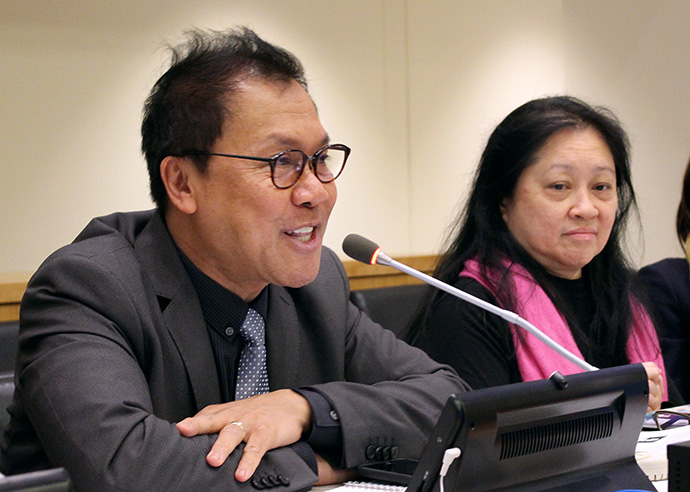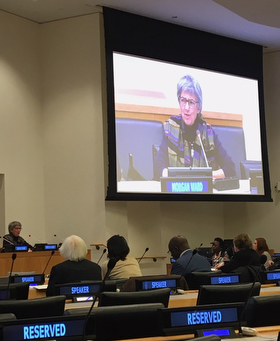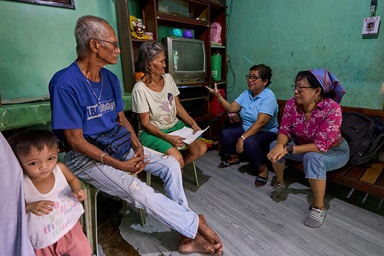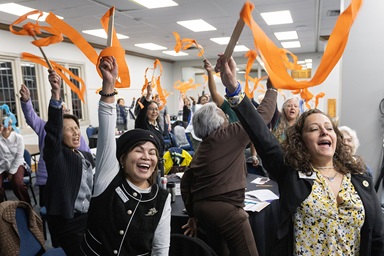Religious traditions are part of an ambitious United Nations’ agenda to substantially improve human lives around the world by 2030.
Funding the Sustainable Development Goals, which focus on essential needs such as livelihoods, education and gender parity, will require an “economy of life” that places human lives at the forefront, said participants at a Jan. 29 forum at U.N. Headquarters.

They were part of the Fifth Annual Symposium on the Role of Religion and Faith-Based Organizations in International Affairs, a program founded by multifaith partners, including the United Methodist Board of Church and Society.
The Rev. Liberato “Levi” Bautista, who heads the social justice agency’s U.N. office, is a lead organizer. As the U.N. approaches its 75th anniversary in 2020, he said, there is a call to work closer together, not just as member states but as “we the people.”
United Methodist Bishop Hope Morgan Ward provided a real-life illustration of what she called “the importance of the kind of conversation that we’re having today.”
During the opening panel, Ward was seated next to Anwar Khan, president of Islamic Relief USA. That organization, she explained, “has become one of our beloved partners” in response to the two huge hurricanes, Matthew and Florence, which struck her episcopal area of North Carolina in the past two years.
Islamic Relief has sent more than 120 disaster response volunteers, in groups of 20, to eastern North Carolina through a shared ministry of rebuilding the infrastructure and economy, Ward said.
Such multifaith and faith-based initiatives “are critical in facing a multitude of challenges that we have in the world today,” the bishop said. Through collaboration, whether in hands-on fashion or a global forum at the U.N., “we offer our best thinking and we determine together our best engagement.”

United Methodist Bishop Hope Morgan Ward (far left and on screen) was part of a panel presentation during a daylong symposium on the role of religion and faith-based organizations in international affairs at the United Nations. Photo by Linda Bloom, UMNS.
Sustainable Development Goals
According to the United Nations, the 17 Sustainable Development Goals “are the blueprint to achieve a better and more sustainable future for all.” The interconnecting goals address global challenges, including those related to poverty, inequality, climate, environmental degradation, prosperity, and peace and justice. The target date to achieve all goals is 2030. Read more
Khan pointed out that Islamic social financing, through traditional instruments of obligatory and voluntary giving, offers an accessible source of financing for sustainable development and can facilitate the need “to work with local, faith-based activists around the world” on implementation of the goals.
Islamic Relief formally adopted a rights-based approach to such funding in 2010, Khan said. For example, the desire to support the rights of minorities is a factor in several peace-building programs in South Asia, Southeast Asia and East Africa.
The World Council of Churches, another organizer of the symposium, recognizes the God-given dignity of all people and is “committed to promoting an equitable sharing of the benefits of development,” said Peter Prove, WCC director of the Commission of the Churches on International Affairs.
Lazarous Kapambwe, Zambia’s U.N. ambassador, encouraged religious and faith-based groups to harness their influence.
“Both the state and the private sector are key players in the implementation of agenda 2030 of the Sustainable Development Goals,” he said. “But there is one force that has the capacity to put the fear of God in either of them and that is the citizens. You represent one of the largest platforms for the citizens.”
Bautista pointed to the ethical imperative of a moral budget focused on the flourishing of life and questioned whether the current “financial architecture” enhances or impoverishes the public coffers, particularly as private financing replaces public resources.
“Human beings are rights bearers,” Bautista told United Methodist News Service. “Access to funds that enhance human dignity must be ensured by duty bearers, the nation states.”
Lidy Nacpil, a United Methodist and activist from the Philippines, told the gathering that she sees several major challenges in incorporating human rights in the financing of development.
One problem, she said, is the “fundamental conflict” between fulfilling human rights and an international financial system that gives “primacy” to the pursuit of profit. Repeated cycles of debt crisis in the last four decades also do little to resolve the repayment burdens placed on impoverished countries, noted Nacpil, who is co-coordinator of the Asian-Peoples’ Movement on Debt and Development.
States bear the primary duties in the realization of human rights goals “and have the obligation to take the lead in ensuring sustainable development.” But in past few decades, she charged, there has been a drive to reduce the state’s role in the economy “and give way to markets.”
In addition, the push for greater reliance on the private sector for financing development can lead to the privatization of scare public resources and “can undermine the ability of states to protect and fulfill human rights and present threats to the realization of these rights,” Nacpil said.
“Citizens movements, along with faith-based organizations and communities, have to not only serve as the moral conscience but also serve as compelling forces to generate the political will needed or the political changes needed,” she said.
Sister Winifred Doherty, a member of Good Shepherd Sisters, pointed out that Catholic social teaching provides excellent criteria for an adjustment of the market. “The disparity between the accumulation of extreme wealth and the inescapability of poverty offends the dignity of human beings,” she said. “It is an affront to the common good and tends toward disastrous, cyclical misery.”
Bishop Ingeborg Midttomme of the Church of Norway believes the Sustainability Development Goals can be achieved because “the world has never been richer.”
Related Story
While raising revenue is not easy, she said, the experience of Norwegian society is that health, education and social protection must be financed through taxes. “People must see that by paying taxes, you gain rights.”
Faith groups also have a moral imperative to support social protection, said Rabbi Diana Gerson of the New York Board of Rabbis. In modern society, if governments are falling short in that protection, religious traditions must figure out how to pick up that burden, she added.
Azza Karam, coordinator of the U.N. Interagency Task Force on Religion and Development, a co-sponsor of the symposium, suggested that knowing how much of the annual budgets of faith-based organizations are spent “on communities other than our own” would be a starting point.
“If we want to be genuine about arguing that religious financing is different, we have to be prepared to know how different,” she said.
Bloom is the assistant news editor for United Methodist News Service and is based in New York.
Follow her at https://twitter.com/umcscribe or contact her at 615-742-5470 or [email protected]. To read more United Methodist news, subscribe to the free Daily or Weekly Digests.
Like what you're reading? Support the ministry of UM News! Your support ensures the latest denominational news, dynamic stories and informative articles will continue to connect our global community. Make a tax-deductible donation at ResourceUMC.org/GiveUMCom.




